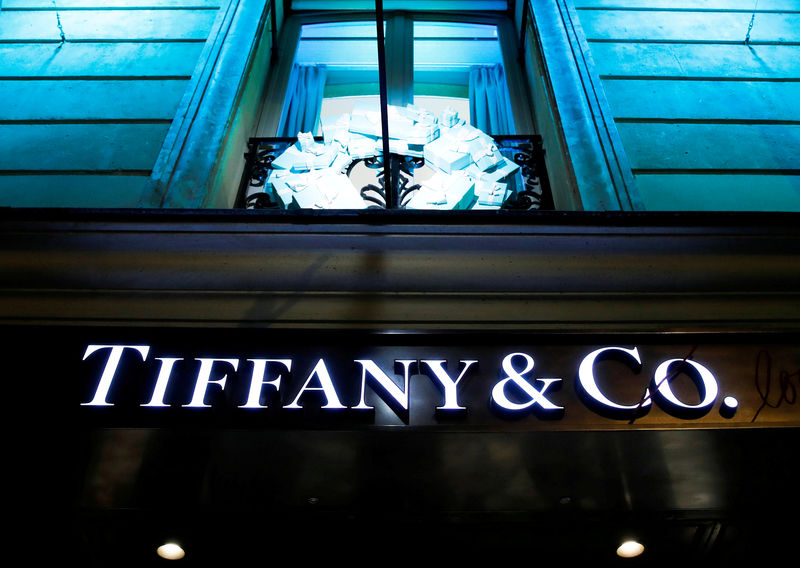By Sarah White and Gwénaëlle Barzic
PARIS (Reuters) - Louis Vuitton owner LVMH has agreed to buy Tiffany for $16.2 billion in its biggest acquisition yet, as the French luxury goods maker bets it can restore the U.S. jeweller's lustre by investing in stores and new collections.
The $135-per share cash deal will boost LVMH's smallest business, the jewellery and watch division that is already home to Bulgari and Tag Heuer, help it expand in one of the fastest-growing industry sections and grow its U.S. presence.
It will have challenges to overcome too, as spending patterns shift and Chinese shoppers retreat from the United States to buy more at home, one of the side effects of a Beijing-Washington trade war that has weighed on Tiffany.
And the U.S. jeweller is still in turnaround mode as it tries to rejuvenate its image and lure shoppers online.
But the New York-based brand, founded in 1837 and known for its signature robin's egg blue boxes, still has a resonance as the go-to purveyor of engagement rings only a handful of rivals can match, such as Richemont-owned Cartier.
"It's an American icon, which is now going to become a little French too," LVMH's Chairman and Chief Executive Arnault told Reuters in an interview.
LVMH finance chief Jean-Jacques Guiony told analysts that taking Tiffany off the stock market and investing in its products would help the company deliver its revival plan.
"We expect to bring Tiffany time and capital, which are two things that are not too easy to get when you report quarterly to the stock market," he said, adding LVMH would build on popular new Tiffany lines such as its more modern "T" jewellery ranges and saw potential for the brand in accessories like scarves.
The purchase crowns a string of acquisitions through which Arnault, France's richest man, has built up his conglomerate, including fashion brands like Christian Dior, wineries, and beauty retailers like Sephora.
Not all are profitable to the same degree - the group is still trying to revive its Marc Jacobs label - but Arnault cited the firm's 2011 acquisition of Bulgari as a model for Tiffany.
The group invested in store revamps, new product ranges and communication at the Italian jeweller, and lifted operating profits fivefold, Arnault said.
"I'm not saying we can do that (with Tiffany), but I think the potential is there," he added, saying the deal, to be financed with bonds and loans, would add 500 million to 600 million euros to LVMH operating profits in the first 12 month.
LVMH does not break out earnings for individual brands. The deal is expected to close in mid-2020.
COURTSHIP
LVMH shares were up 1.2% at 1430 GMT on Monday, while Tiffany's stock rose 6% in early New York trade.
Tiffany said in a joint statement with LVMH that its board of directors recommended shareholders approve the transaction.
The $135 per share bid is marks 7.5% premium over Tiffany's closing share price on Friday, and is more than 50% above where it stood before LVMH's interest emerged.
LVMH's official courtship of Tiffany lasted about five weeks after a first approach of $120 per share in mid October.
But LVMH has had eyes on the brand, also made famous by the 1961 movie "Breakfast at Tiffany's" starring Audrey Hepburn, for years, sources familiar with the situation said.
Tiffany, which has more than 300 stores worldwide and made almost half of its sales at home last year, has been struggling to win over young shoppers and its success outside of the United States has been uneven.
Like rivals, it is also likely to face a hit from street protests in Hong Kong, which has forced retailers to close stores. Tiffany reports third quarter earnings on Dec. 5.
Competition from lower-priced rivals such as Denmark's Pandora A/S and Signet Jewelers has muddied the waters in recent years, but LVMH is likely to want to position the brand at the higher end of the market, which is more profitable.
"Bernard Arnault will be able to invest massively in repositioning the brand, taking it more upmarket in the United States, and also pushing more in Asia and in Europe," one source close to the transaction said.
Growth in jewellery outpaced that of other luxury businesses such as fashion in 2018, according to consultancy Bain & Co, which forecast comparable sales in the $20 billion global jewellery market were set to grow 7% this year.
"Tiffany's brand equity and the strength of the image of its iconic 1837 Blue Box are more valuable than the current financials suggest," Jefferies analyst Flavio Cereda said in a note published just before the deal was confirmed.
"LVMH can leverage off these to launch a more concerted 'attack' on the Asian millennial market."
Chinese consumers in their 20s and 30s are helping to fuel growth across the luxury goods industry.
LVMH has no short term plans to shake-up management at Tiffany, where ex-Bulgari executive Alessandro Bogliolo is now CEO, Arnault said, though he didn't rule out changes in the longer term.

Citi and JPMorgan (NYSE:JPM) advised LVMH, while Centerview Partners and Goldman Sachs (NYSE:GS) worked with Tiffany.